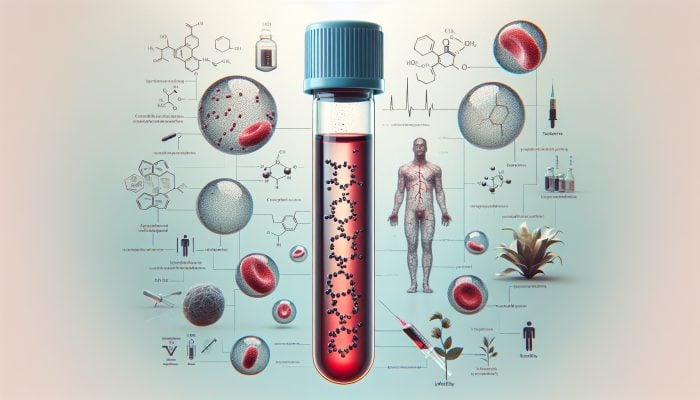Discover the Vital Advantages of Testosterone Blood Testing for Enhanced Health
Gain Comprehensive Insights into Your Health with a Testosterone Blood Test

The Testosterone Blood Test in Nuneaton serves as an essential diagnostic tool that accurately measures the levels of testosterone present in your bloodstream. This critical analysis yields significant insights into your hormonal health, enabling the identification of various conditions associated with hormonal imbalances. Commonly diagnosed issues through this testing encompass:
- hypogonadism, a medical condition characterised by inadequate testosterone production
- Infertility, which may arise from low hormone levels
- Erectile dysfunction, a prevalent concern for many men
- Osteoporosis, where reduced testosterone levels may lead to diminished bone density
- Adrenal disorders, which can significantly affect hormone levels
- Low libido, impacting sexual desire and overall satisfaction
- Chronic fatigue syndrome, frequently associated with hormonal fluctuations
- Depression and mood disorders, which may have underlying hormonal causes
Being well-informed about your testosterone levels equips both you and your healthcare provider to make well-informed decisions regarding your health and available treatment options. This ultimately promotes improved well-being and enhances your overall quality of life.
 Follow Our Step-by-Step Guide for Your Testosterone Blood Test Procedure
Follow Our Step-by-Step Guide for Your Testosterone Blood Test Procedure
Undergoing a testosterone blood test is a simple and minimally invasive process. A qualified healthcare professional will carefully collect a small blood sample, usually taken from a vein in your arm. This quick procedure typically lasts only a few minutes and is conducted in a clinical setting, such as a hospital or specialised laboratory. After the blood draw, your sample will be sent to a laboratory for thorough analysis of your testosterone levels.
Most patients report only minor discomfort during the needle insertion, with the sensation being quite brief. If you have any concerns regarding needle procedures, discussing these with your healthcare provider in advance can lead to strategies that enhance your comfort during the test and alleviate any anxiety you may experience.
Why Should You Consider a Testosterone Blood Test?
If you’re experiencing symptoms such as persistent fatigue, reduced libido, emotional fluctuations, or unexpected weight gain, your doctor may recommend a testosterone blood test. Such symptoms could indicate low testosterone levels, medically referred to as hypogonadism, which can considerably impact your quality of life.
Furthermore, men aged 40 and older or those with a family history of hormonal disorders may be encouraged to pursue testing proactively. Early detection is vital, as it can facilitate better management of potential health concerns, underscoring the importance of timely awareness and assessment. Openly discussing your symptoms with your healthcare provider is crucial in determining whether to proceed with testing.
How to Interpret Your Testosterone Blood Test Results Effectively

Your testosterone blood test results will indicate whether your testosterone levels fall within the normal range, are low, or are elevated. Normal ranges can vary due to factors such as age and individual health conditions; however, they generally serve as benchmarks for assessing various health issues. Low testosterone levels may indicate hormonal imbalances, signalling the need for further investigation or treatment.
Your healthcare provider will interpret your results in conjunction with your symptoms and medical history, ensuring a comprehensive approach to your health. Understanding your testosterone levels is a critical step in managing not only your hormonal health but also your overall quality of life.
Expert Insights on Testosterone Blood Testing in Nuneaton
What Can You Expect from Your Testosterone Blood Test Results?
Upon receiving your testosterone blood test results, you will see a numerical value indicating your testosterone level. This figure is essential for diagnosing conditions like hypogonadism, characterised by insufficient testosterone production. Conversely, elevated testosterone levels may suggest the presence of conditions such as tumours or adrenal hyperplasia.
Experts recommend that a testosterone level falling below 300 ng/dL typically signifies a hormonal imbalance requiring attention. However, each case is unique, and results should be evaluated alongside a healthcare professional who understands your individual circumstances. Having an experienced doctor interpret your results is crucial for determining the appropriate next steps in your health journey.
What Essential Preparations Are Required Before Your Testosterone Blood Test?

Preparing for a testosterone blood test may involve specific steps to ensure the accuracy of your results. Your healthcare provider may recommend fasting for a designated period before the test, typically requiring you to refrain from eating or drinking anything other than water for 8 to 12 hours prior to the test.
Additionally, it is crucial to inform your doctor about any medications or supplements you are currently taking, as these can influence testosterone levels. Here are some actionable steps to consider before your test:
- Adhere to fasting instructions, generally for 8-12 hours.
- Refrain from alcohol consumption for at least 24 hours before the test.
- Consult your doctor regarding any medications that may influence testosterone levels.
- Stay well-hydrated by drinking water to facilitate blood flow.
By following these guidelines, you can help ensure that your testosterone levels are measured accurately, leading to a clearer understanding of your health status.
How to Identify Credible Testing Facilities in Nuneaton
Nuneaton is home to numerous reputable clinics and hospitals that offer testosterone blood testing services. For individuals seeking reliable testing options, facilities such as George Eliot Hospital and various local private clinics provide these tests with a focus on patient comfort and care.
You can expect a professional environment and experienced staff who will guide you through the testing process. It is advisable to verify that the facility you choose is accredited and has received positive patient feedback, ensuring you receive quality care tailored to your specific needs.
The Importance of Regular Testosterone Testing for Optimal Health
Regular testosterone tests are vital for tracking changes in hormone levels over time. Given that hormone levels can fluctuate due to a multitude of factors, periodic testing plays an indispensable role in effectively managing ongoing health conditions.
Engaging in routine testing can facilitate early detection of potential health issues, allowing for timely interventions and treatments. This proactive approach is particularly beneficial for men approaching middle age, as testosterone levels naturally decline with age. Consistent testing provides peace of mind and underscores the importance of prioritising your hormonal health.
Understanding Costs and Insurance Coverage for Testosterone Testing
The average cost of a testosterone blood test in Nuneaton may vary based on the facility and whether you have health insurance coverage. Typically, patients can expect to pay between £50 and £150 for the test, which may include consultations.
Many insurance plans do cover testosterone testing; however, it is essential to verify the specifics of your policy to understand the coverage details. Consulting with your insurance provider can clarify any potential out-of-pocket expenses you may incur, ensuring you are fully informed before proceeding with the test.
Exploring the Benefits of Testosterone Testing for Nuneaton Residents
What Are the Advantages of Choosing Local Testing Services for Your Hormonal Health?
Opting to have your testosterone blood test conducted locally in Nuneaton presents numerous advantages that greatly enhance your overall healthcare experience. The convenience of local testing allows for quicker results and easier access to follow-up care without the burden of lengthy travel. Here are additional benefits to consider:
- Minimised travel time and associated costs.
- Immediate access to healthcare providers for consultations and follow-ups.
- Tailored care from familiar local doctors who understand your unique health context.
- Enhanced communication with healthcare providers knowledgeable about regional health trends.
These advantages make local testing not only practical but also beneficial for fostering strong relationships with your healthcare providers, ultimately improving your health outcomes.
How Local Testing Enhances Healthcare Outcomes
Local testosterone testing can lead to improved follow-up care and more personalised treatment plans. When your healthcare provider is nearby, they can closely monitor your progress and make necessary adjustments to your treatment based on your results.
This proximity allows for more frequent consultations, enabling ongoing modifications to therapy and lifestyle recommendations. Local healthcare professionals also possess a better understanding of regional health issues, which can inform treatment decisions. The personal rapport developed through regular visits can significantly enhance your overall healthcare experience and outcomes.
What Support Services Are Available for Individuals Undergoing Testosterone Testing in Nuneaton?
Nuneaton offers a variety of support services tailored for individuals undergoing testosterone testing. These services can greatly contribute to your overall health management. For instance, counselling services provide emotional support for those grappling with the psychological effects of hormonal changes, while nutritional advice can assist in improving diet and lifestyle habits.
Moreover, fitness centres may offer specialised exercise programs aimed at optimising testosterone levels. Accessing these supportive services ensures you receive comprehensive care, addressing both physical and emotional health needs.
Efficiency Advantages of Local Testosterone Testing
Choosing to undergo testosterone testing in Nuneaton can considerably reduce the time spent travelling to appointments and waiting for results. Local testing allows you to swiftly access healthcare providers, facilitating rapid diagnosis and the initiation of treatment if necessary.
This efficiency is particularly advantageous for those balancing work and personal commitments, as local facilities often boast shorter wait times. Furthermore, when follow-up visits are required, being close to your healthcare provider ensures you can easily attend appointments, keeping your health journey on track.
Cost-Effectiveness of Local Testing Services in Nuneaton
Testing locally in Nuneaton can be more financially viable compared to seeking services in larger cities, where costs may be elevated due to higher demand. The typical cost of testosterone blood tests in Nuneaton generally ranges from £50 to £150, making it an accessible option for many individuals.
Additionally, reduced travel expenses and easily accessible services contribute to the overall affordability of local testing. By choosing to stay within Nuneaton for your healthcare needs, you can effectively manage costs while receiving excellent care.
Maximising the Value of Your Testosterone Test Results
What Health Implications Are Associated with High or Low Testosterone Levels?
Recognising the health implications of both high and low testosterone levels is crucial for guiding your health decisions. Low testosterone can result in decreased energy, mood fluctuations, and sexual dysfunction, while elevated testosterone levels may indicate more severe health issues, such as tumours. Being aware of these signs empowers you to pursue appropriate treatments and interventions.
Engaging in discussions with a healthcare professional regarding your test results will clarify how your testosterone levels impact your overall health. From there, tailored treatment options can be developed based on these findings, ensuring you receive optimal care for your specific situation.
How to Effectively Discuss Your Test Results with Your Doctor?
Having an open and informative dialogue with your doctor regarding your test results is essential. Start by expressing any concerns or symptoms you may be experiencing, as these will provide context for your results. Pose direct questions about the implications of your testosterone levels, possible treatment alternatives, and beneficial lifestyle modifications.
Bringing a list of questions and notes about your symptoms can foster a productive conversation. Your healthcare provider’s expertise will guide you in understanding your results and outlining the subsequent steps tailored to your health needs.
What Are the Next Steps After Your Testosterone Testing?
After undergoing your testosterone blood test, the next steps will be determined based on the results obtained. If your testosterone levels are found to be low, your healthcare provider may recommend further testing to identify underlying causes, such as hormonal imbalances or other health concerns.
Next steps may also involve lifestyle modifications, including dietary changes, exercise recommendations, or hormone replacement therapy. Regular follow-up appointments may be necessary to monitor your levels and evaluate the effectiveness of any strategies implemented.
The Importance of Regularly Monitoring Your Testosterone Levels
Consistently monitoring your testosterone levels is essential for detecting changes and evaluating the effectiveness of any treatments you pursue. Regular testing, ideally every six to twelve months, allows you to track trends in your hormone levels, providing valuable insights into your overall health status.
Keeping a journal of your symptoms and lifestyle factors, such as diet and exercise, can help both you and your healthcare provider understand the relationship between these elements and your testosterone levels. This proactive approach equips you to make informed decisions regarding your health and treatment options.
What Lifestyle Changes Can Positively Influence Testosterone Levels?
Your lifestyle plays a significant role in influencing testosterone levels. Factors such as diet, exercise, sleep quality, and stress management all contribute to maintaining hormonal balance. For instance, engaging in regular physical activity can enhance testosterone levels, while chronic stress may lead to reductions.
Making informed health choices, such as incorporating a balanced diet rich in healthy fats and essential vitamins, can support optimal testosterone production. Understanding these lifestyle factors empowers you to take proactive measures to maintain your hormonal health.
Exploring the Research-Backed Advantages of Testosterone Blood Testing in Nuneaton
Why is Early Detection of Hormonal Imbalances Important?
Early detection of hormonal imbalances through testosterone blood testing can lead to timely interventions that significantly improve health outcomes. Identifying low testosterone levels early allows for targeted treatments that can relieve symptoms and prevent further complications.
Healthcare professionals stress the importance of regular testing, particularly for individuals at heightened risk for hormonal issues. By detecting imbalances early, patients can avert the development of chronic conditions and experience a better quality of life.
What Are the Long-Term Health Benefits of Regular Testosterone Monitoring?
Consistent monitoring of testosterone levels provides multiple long-term health benefits, including effective management of chronic conditions and enhanced quality of life. Maintaining balanced testosterone levels can contribute to improved physical health, enhanced mood, and better cognitive function.
As testosterone levels are linked to various bodily functions, ensuring they remain within a healthy range helps protect against conditions like osteoporosis and cardiovascular diseases. This proactive approach contributes to longevity and overall well-being.
How Do Test Results Shape Personalised Treatment Plans?
Results from a testosterone blood test can significantly influence the development of personalised treatment plans tailored to the individual’s hormonal needs. Based on these findings, healthcare providers can recommend specific therapies or lifestyle modifications aimed at restoring hormonal balance.
These tailored approaches enhance treatment efficacy, ensuring patients receive care that addresses their unique circumstances. The outcome is a more focused strategy for optimising health and effectively managing symptoms.
Implementing Trusted Strategies for Testosterone Blood Testing in Nuneaton
How to Select the Best Clinic for Your Testosterone Blood Test?
Choosing the right clinic for your testosterone blood test is crucial for ensuring accurate results and high-quality care. Consider factors such as the clinic’s accreditation, reputation, and patient feedback when making your selection. For instance, facilities affiliated with the National Health Service (NHS) typically adhere to strict standards of care.
Additionally, visiting the clinic beforehand can provide valuable insights into the environment and professionalism of the staff. Recommendations from friends or family can also guide you towards reputable options in Nuneaton, ensuring your testing experience is as comfortable and efficient as possible.
What Key Qualities Should You Look for in a Healthcare Provider for Hormonal Testing?
When selecting a healthcare provider for hormonal testing, it is essential to seek professionals with expertise in managing hormonal health. Providers who specialise in endocrinology or men’s health often possess the necessary experience to interpret test results and develop effective treatment plans accurately.
Moreover, patient reviews and testimonials can offer valuable insights into the quality of care provided by the healthcare professional. Trust and communication are critical; therefore, finding a doctor with whom you feel comfortable discussing sensitive health issues is imperative for a successful partnership in your healthcare journey.
What Strategies Can You Implement to Sustain Healthy Testosterone Levels After Testing?
Maintaining healthy testosterone levels following testing requires a comprehensive approach involving diet, exercise, and lifestyle modifications. Regular physical activity, particularly strength training, can naturally elevate testosterone levels while enhancing overall health.
A balanced diet rich in whole foods, healthy fats, and essential vitamins also supports hormonal health. Additionally, managing stress through mindfulness practices, adequate sleep, and relaxation techniques plays an integral role in regulating hormone levels. By implementing these actionable steps, you empower yourself to take control of your health and maintain optimal testosterone levels.
What Common Questions Arise About Testosterone Testing?
What does a testosterone blood test involve?
A testosterone blood test measures the level of testosterone in your blood, aiding in diagnosing hormonal imbalances and associated health conditions.
How should I prepare for my testosterone blood test?
Preparation may involve fasting for 8–12 hours prior to testing and avoiding certain medications. Always consult your healthcare provider for specific instructions.
Where can I get a testosterone blood test in Nuneaton?
You can obtain testing at local clinics and hospitals in Nuneaton, such as George Eliot Hospital or dedicated private clinics.
What do low testosterone levels indicate?
Low testosterone levels can signify hypogonadism or other hormonal imbalances, potentially leading to symptoms like fatigue and diminished libido.
Why is it essential to undergo regular testosterone testing?
Regular testing assists in monitoring hormonal changes over time, ensuring timely intervention and effective management of health conditions.
What are the typical costs associated with a testosterone blood test?
Costs usually range from £50 to £150, depending on the facility and whether you have insurance coverage.
How can I interpret my testosterone test results?
Your healthcare provider will interpret the results based on established normal ranges, symptoms, and your overall health, helping you understand the available treatment options.
What lifestyle changes can I implement to maintain healthy testosterone levels?
Regular exercise, a balanced diet, sufficient sleep, and effective stress management can all contribute to maintaining healthy testosterone levels.
What support services are available in Nuneaton for testosterone testing?
Support services include counselling, nutritional advice, and fitness programs tailored for individuals undergoing hormonal testing.
How often should I check my testosterone levels?
It is advisable to monitor testosterone levels every six to twelve months, based on your health status and any treatment plans in place.
Connect with us on Facebook!
This Article Was First Found On https://bloodtest.co.uk
The Article Testosterone Blood Test Guide for Nuneaton Residents Was Found On https://limitsofstrategy.com
References:
https://limitsofstrategy.com/testosterone-blood-test-guide-for-nuneaton-residents-2/


